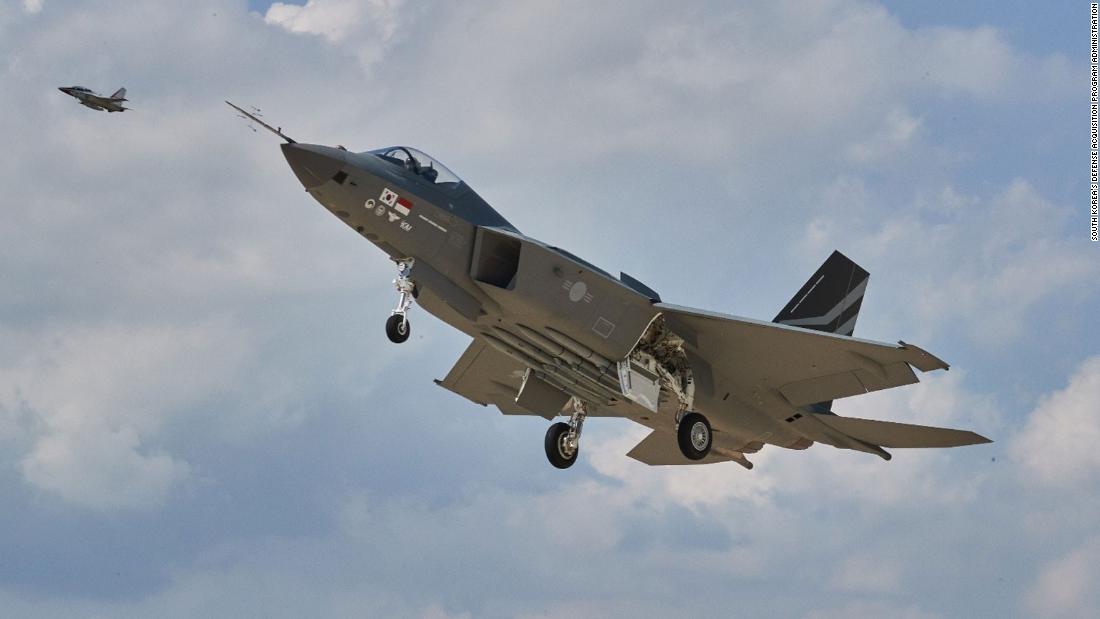
The prototype jet took a 33-minute roundtrip flight from an air force base in the southern city of Sacheon, said South Korea’s Defense Acquisition Program Administration (DAPA).
The pilot, Maj. Ahn Jun-hyun, admitted to being nervous beforehand, but said that after take off “everything went smoothly so I flew the whole flight route as planned.”
The jet is the first of a fleet of six KF-21 prototypes made by Korea Aerospace Industries that will conduct more than 2,000 test flights from now until 2026, when mass production and deployment will begin, DAPA said.
A total of 120 jets are expected to be delivered to the South Korean air force by 2030.
Once operational, the KF-21 is expected to be armed with a range of air-to-air and air-to-surface missiles — and possibly even air-launched cruise missiles. The twin-engine fighters will come in single- and two-seat versions.
On Tuesday, the jet was equipped with four mock-up Meteor air-to-air missiles and an infrared search-and-track system, and reached speeds of around 400 kilometers per hour (250 mph).
The KF-21 is a joint project between South Korea and Indonesia in which Seoul holds 80% of shares.
While only 65% of the KF-21’s parts are of South Korean origin, its maiden flight still marks a significant achievement for a country that doesn’t have a lengthy history of aircraft production.
The only other countries to have developed and flown an advanced supersonic jet fighter are the United States, Russia, China, Japan, France, Sweden and a European consortium of the United Kingdom, Germany, Italy and Spain.
Of those, only the US and China have deployed domestic-made fifth-generation fighter jets — planes that feature stealth technologies, radar-jamming capabilities and avionics that integrate onboard and remote data to give pilots a real-time picture of their operation, according to NATO’s Joint Air Power Competence Center.
While the DAPA calls the KF-21 a 4.5-generation fighter jet because it lacks such features as an internal weapons bay that would make it more stealthy, analysts say it may be able to fly higher and faster than the newest US-made fifth-generation fighter, the F-35.
“The KF-21 is the first fighter aircraft made with domestic technology, and it indicates that South Korea is now able to build fighter aircraft on its own. It will also be a stepping stone to develop better fighter aircraft and operate locally developed arms,” DAPA said last year.
Peter Layton, a fellow at the Griffith Asia Institute in Australia, on Wednesday called the KF-21’s flight an “impressive” milestone.
“The program has significantly enhanced South Korean aerospace capabilities particularly in design, manufacture, airframe components and avionic systems,” said Layton, a former Royal Australian Air Force officer.
The KF-21 is expected to replace South Korea’s F-4 and F-5 fighters, third-generation US-designed jets introduced in the 1960s.
As production runs are increased, it could also replace South Korea’s fourth-generation F-16s and F-15Ks, Abraham Ait, chief editor of Military Watch Magazine, wrote in The Diplomat in 2020.
South Korea also operates F-35 stealth fighters.
Layton said when operational the KF-21 would improve South Korea’s defensive and offensive capabilities in the air.
“Given the parlous state of the aging North Korean air force fighters, the KF-21 considerably over matches them,” he said.
Layton said South Korea’s F-35s have superior stealth capabilities to the KF-21 and are better to penetrate an enemy’s radars.
“The (South Korean) air force will then have a mix of F-35s for strike operations and KF-21s for air defense operations. This concept makes good use of the F-35, which is optimized for attacking ground targets whereas the KF-21 has been optimized for air-to-air missions,” he said.
The KF-21 has significant export potential because it is expected to be cheaper than the F-35s the US sells to foreign militaries.
Thailand, the Philippines, and possibly even Iraq “could be leading clients for the fighter,” Ait wrote, adding that each of those countries operates the same kind of aircraft the KF-21 has been designed to replace. Those countries also have been customers for South Korea’s indigenously developed FA-50 light-attack fighter.
President Yoon said after Tuesday’s test that “a turning point has been created for the expansion of our defense industry exports.”

